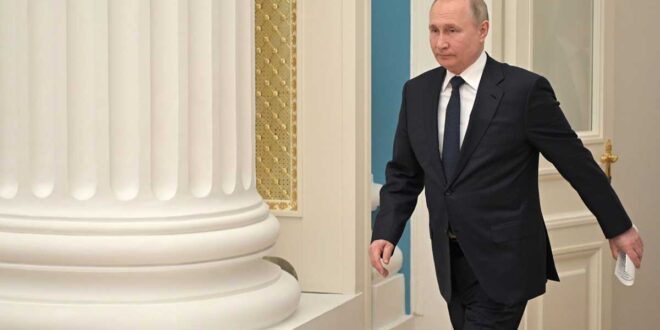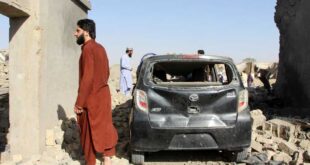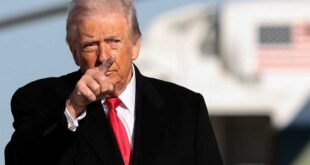Russian President Vladimir Putin has signed an order to endorse Russia’s updated foreign policy concept which was complied and presented by the Ministry of Foreign of Affairs. The new concept was updated to incorporate additional measures and redefine parameters of necessary actions, especially against consistent the United States, Western and European confrontation and determine important roles in the emerging multipolar world by the Russian Federation.
Putin explained, at a meeting with permanent members of the Russian Security Council on March 31, the need for a major adjustment of key strategic planning documents, including the foreign policy concept, on the basis of drastic changes on the world stage.
“The Foreign Ministry, acting in collaboration with the presidential administration, the office of the Security Council, the government and numerous ministries and agencies, has done extensive, thorough work to update and harmonize the concept with current geopolitical realities. This is a balanced document that will serve as a basis for our practical actions in the mid-term and more distant future.” Putin said in his introductory remarks.
In a concized speech during the meeting, Foreign Minister Sergey Lavrov emphasized that the new concept takes into the provisions of the National Security Strategy, which was approved by in 2021. It also notes a high degree of continuity with the previous edition of 2016 in terms of the fundamental principles of our foreign policy, primarily its independence and focus on creating favorable external conditions for the progressive development of Russia, ensuring its security and improving the well-being of Russian citizens.
“The logic of the document reflects the changing geopolitical realities, in fact, revolutionary advances on the outer contour, which have received a visible acceleration with the start of a special military operation,” Lavrov told the meeting.
He, however, added: “In particular, the unprecedented level of international tension over the past decade is stated. The existential nature of threats to the security and development of our country, created by the actions of unfriendly states, is recognized. The main initiator and conductor of the anti-Russian line is directly named the United States of America, and in general, the policy of the West, aimed at the all-round weakening of Russia, is characterized as a hybrid war of a new type.”
The main long-term trends in international development are characterized, including the crisis of economic globalization, which until recently was carried out according to American rules. One of the factors is that the world economy is undergoing a major restructuring and is moving to a new technological basis. The redistribution of development potential in favor of new centers of growth leads to the formation of a multipolar world order, and this is a key trend in international relations at the present stage.
“We set out in the concept our vision of the principles of a more balanced and fair world order. Among them are polycentricity, sovereign equality of states, ensuring their right to choose development models, upholding the cultural and civilizational diversity of the world. Assistance in the establishment of a multipolar world order is defined as a framework task for all areas of foreign policy,” he said.
Emphasis is placed on the need to ensure the rule of law in international relations. It is proclaimed that the progressive development of international law must take into account the realities of today’s world. In the face of acute external threats, there is readiness to observe the principle of the indivisibility of security is confirmed, but only in relation to those states and their associations that show reciprocity in this matter.
The approach to work in the UN focuses on increasing the effectiveness of this organization, on reaffirming the fundamental goals and principles of its Charter, which the West is trying to undermine in its practical actions. Important innovations are enshrined in terms of the conditions for the use of force in self-defense within the framework of unconditional adherence to the relevant requirements of Article 51 of the UN Charter.
The concept provides for the possibility of taking symmetrical and asymmetric measures in response to unfriendly actions against Russia. The thesis is introduced about the use of the Armed Forces to repel or prevent an armed attack on Russia and its allies. Thus, Russia unequivocally declare to defend the right of the Russian people to existence and free development.
The provisions that affect the protection of Russian traditional spiritual and moral values, building cooperation based on a single spiritual and moral landmark, common to all world religions, are revealed. Absolute rejection of neo-colonial practices and any kind of hegemonism.
According to Lavrov, “among the undoubted priorities are ensuring the rights of our citizens and organizations abroad, providing support to compatriots, countering Russophobia, strengthening the position of the Russian language in the world, fighting for historical truth, protecting our culture, depoliticizing sports, and establishing new forms of sports cooperation.”
In the regional section of the concept, there is an emphasis on Russia’s strategic interests in the context of deepening Eurasian integration based on the Union State of Russia and Belarus, the Eurasian Economic Union, the Collective Security Treaty Organization, the CIS, the formation of a large Eurasian partnership, and the further strengthening of the Shanghai Cooperation Organization and BRICS.
As the most important resource, the course towards unlocking the potential of strategic partnership with our great neighbors – the People’s Republic of China, the Republic of India, the countries of the Islamic world, as well as with the states of ASEAN, the African continent, Latin America and the Caribbean is being fixed.
Lavrov concluded that “the commitment to a peaceful solution of all problems that arise in the Arctic region is confirmed. The provisions of the concept assume that the anti-Russian steps of unfriendly states will be consistently and, if necessary, severely suppressed.
On March 31, the Ministry of Foreign Affairs of the Russian Federation published on its website the text (in English, Spanish, and French) of the Concept of the Foreign Policy of the Russian Federation, approved by Presidential Executive Order No. 229 of March 31, 2023.
The 42-page document consists of six sections and a total of 76 paragraphs. The previous version of the concept was adopted in November 2016. Here are a few important aspects including the strategic goals, major objectives and priority areas of the new policy which principally based on the constitution of the Russian Federation.
Russia’s place in the world is determined by its significant resources in all areas of living, its status of a permanent member of the United Nations Security Council, participant in the leading intergovernmental organizations and associations, one of the two largest nuclear powers, and the successor (continuing legal personality) of the Union of Soviet Socialist Republics (USSR).
Russia pursues an independent and multi-vector foreign policy driven by its national interests and the awareness of its special responsibility for maintaining peace and security at the global and regional levels.
Russian foreign policy is peaceful, open, predictable, consistent, and pragmatic and is based on the respect for universally recognized principles and norms of international law and the desire for equitable international cooperation in order to solve common problems and promote common interests.
Russia’s attitude towards other states and interstate associations is contingent on the constructive, neutral or unfriendly character of their policies with respect to the Russian Federation.
With the major trends and prospects for development, Russia will play its role as one of the leading centres of development in the modern world. It plans to maintain strategic stability, strengthen international peace and security; and to strengthen the legal foundations of international relations and to shape an equitable and sustainable world order.
One of its priorities is to deepen integration processes and seek mutually beneficial comprehensive cooperation system based on combined CIS and EAEU, and the states of the Central Asian region.
Russia aims at further strengthening the comprehensive partnership and the strategic cooperation with Asian and Pacific States including, first and foremost, People’s Republic of China, the Republic of India. Further, it will fortify relations with the States in the Middle East and North Africa, based on combining the capacities of all the states and interstate alliances of the regions, including the League of Arab States and the Gulf Cooperation Council.
The new concept also says Russia stands in solidarity with the African states in their desire for a more equitable polycentric world and elimination of social and economic inequality, which is growing due to the sophisticated neo-colonial policies of some developed states towards Africa.
The Russian Federation intends to support further the establishment of Africa as a distinctive and influential centre of world development. Its priority here is Russian-African cooperation in various spheres on a bilateral and multilateral basis, primarily within the framework of the African Union and the Russia-Africa Partnership Forum.
In Latin America and the Caribbean, given the progressive strengthening of the sovereignty and multifaceted potential of Latin American and Caribbean states, the Russian Federation intends to develop relations with them on a pragmatic, de ideologized and mutually beneficial basis, giving priority attention to supporting interested Latin American states under pressure from the United States and its allies in securing sovereignty and independence.
It places emphasis on multifaceted mutually beneficial partnership with the Federative Republic of Brazil, the Republic of Cuba, the Republic of Nicaragua, the Bolivarian Republic of Venezuela, developing relations with other Latin American states, taking into account the degree of independence and constructiveness of their policy towards the Russian Federation.
Most European states pursue an aggressive policy toward Russia aimed at creating threats to the security and sovereignty of the Russian Federation, gaining unilateral economic advantages, undermining domestic political stability and eroding traditional Russian spiritual and moral values, and creating obstacles to Russia’s cooperation with allies and partners. In this connection, the Russian Federation intends to consistently defend its national interests in the European Union.
Russia’s course towards the U.S. has a combined character, taking into account the role of this state as one of the influential sovereign centres of world development and at the same time the main inspirer, organizer and executor of the aggressive anti-Russian policy of the collective West, the source of major risks to the security of the Russian Federation, international peace, a balanced, equitable and progressive development of humanity.
The Ministry of Foreign Affairs of the Russian Federation develops a general strategy of the foreign policy of the Russian Federation and presents relevant proposals to the President of the Russian Federation, implements the foreign policy course, coordinates the activities of federal executive bodies in the area of international relations and international cooperation, and coordinates international relations of the subjects of the Russian Federation.
 Geostrategic Media Political Commentary, Analysis, Security, Defense
Geostrategic Media Political Commentary, Analysis, Security, Defense





